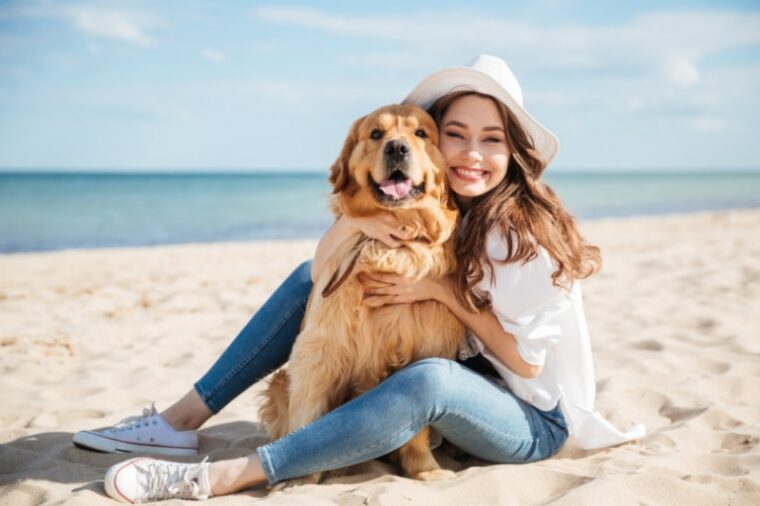
Every time you see the lovable little face of your pup, you probably just want to squeeze and kiss them. Even though we humans love to show affection through hugs and kisses, does that mean that our canine companions feel the same way?
Since we can’t speak in the language of our canine counterparts, many things are left to interpretation by studying body language and noticing certain expressions. Like anything else, some dogs will absolutely adore hugs, but others might not feel that way.
It’s such an individual thing that it’s hard to pinpoint exactly what category your dog falls under. Even though we’ve taken some cues from the experts, you are the one that knows your dog best. So, let’s find out all about dogs and hugs.
Dogs & Body Language
Dogs are so social with humans that sometimes it’s hard to remember that they’re an entirely different species. They want to go where we go, eat what we eat, and play when we play. It seems that they’re attached at the hip at every turn. However, they have their own likes and dislikes.
When showing them physical affection, we all know that pets love a good rub down. They love attention from people they consider a part of their pack. Some dogs are more sensitive than others due to previous abuse or life circumstances.
And sometimes, if your dog has any health issues, such as arthritis, hugs and petting might get painful. So, different areas can impact how a dog responds to hugs and other forms of human affection.
So, let’s break down each of these things one by one to get an excellent picture of how dogs feel.
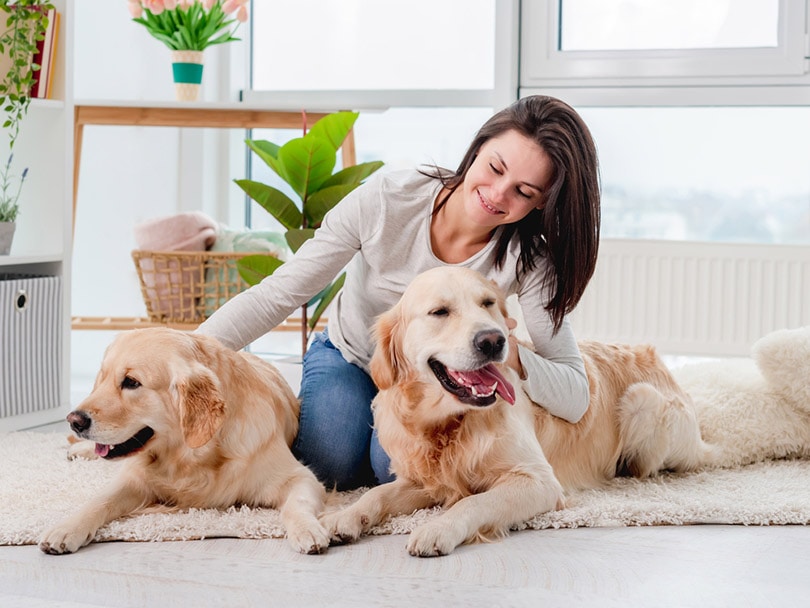
Dogs & Hugs, According to the AKC
According to the AKC, dogs do not like hugs. In fact, they point out that hugging a dog can actually be dangerous. In nature, dogs don’t hug each other, right?
If you’re hugging your dog, they can escape, and they might feel overwhelmed or anxious by your behavior. So, even though you might hug your dog, that doesn’t mean that it necessarily understands what’s going on.
For nervous or territorial dogs, this raises even more of a risk. It can be even more concerning if you make eye contact because this can signal a threat even if it’s unintentional.
While we understand this conclusion made by the AKC, there are plenty of factors to consider here—like the current state of health, individual personality, and the bond with the person giving a hug.
The ASPCA seems to agree—though hugs aren’t natural to dogs, liking hugs depends on your specific pup. If your hug gains a response of excitement, tail wagging, and goofy actions, they probably understand this action and reciprocate the love—even if they don’t totally understand the embrace.
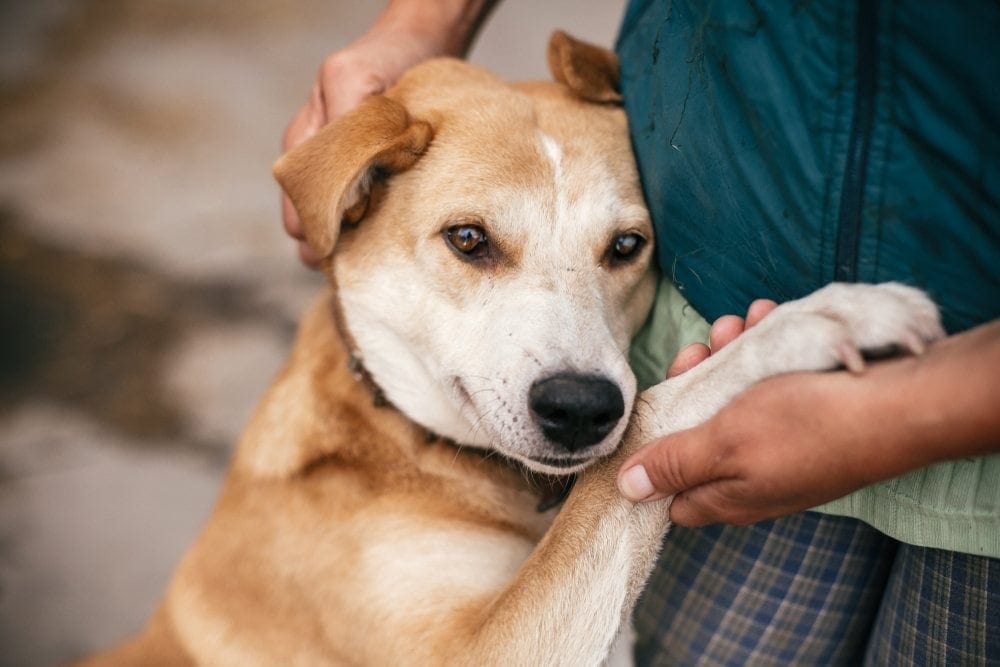
History Matters
If your dog has been raised with your family from puppyhood, they have had more time to grow into your love language. If you’ve always given them hugs as a sign of affection, this is something that they’ve grown acclimated to from day one. So, it’s probably extremely normal behavior for them, and it won’t make them afraid or uncomfortable.
However, if they have a reserved personality or have experienced mistreatment, they might be set in their ways–saying no to human hugs.
Kids & Dogs
On the same note, if you have a new baby, that baby will turn into a toddler that will turn into a crazy child, as all of them do during this stage. If your frantic little kid runs up to them, screeching happily and squeezing your dog’s neck, they might not know how to respond.
That is why it is essential to teach children how to respect a dog’s boundaries and pay attention to their body language. If you notice that your dog seems nervous with visual cues like putting their ears back, it’s time to stop your child and explain that the doggie doesn’t like that.
Allowing your child to continue this behavior, or repeating it yourself if it’s you, is just showing your dog that you don’t respect their boundaries.
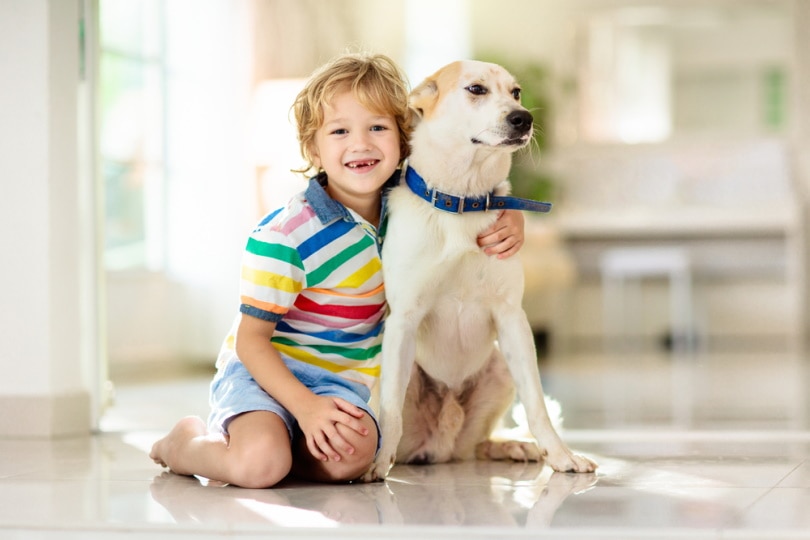
Abuse Cases
If you have a rescue dog, there is always a chance that the dog has been abused or neglected. If the dog wasn’t used to interaction with humans or was treated very poorly by them, this might be even more concerning. An abused dog might even lash out and act aggressively toward its owner for this otherwise affectionate action.
They have no way of comprehending that you mean them no harm. They simply know that humans haven’t been very good to them before, and they’re uncomfortable with what’s going on. So, if you have an abused or neglected animal, you should let them show affection to you and respond in a way that seems mutually beneficial.
Signs of Discomfort
We are firm believers and the power of human-animal connections. If you simply observe your pet in their natural state and show them affection accordingly, you probably won’t even have to ask yourself these questions.
However, you can look for signs of discomfort, such as:
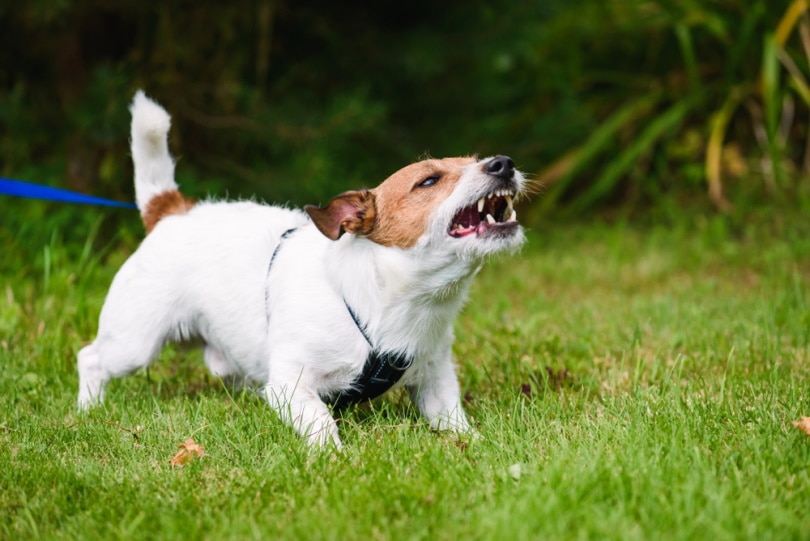
It’s probably pretty likely that your dog is not comfortable with this interaction if they are even slightly apprehensive. But we all know that one oddball pooch will come up to you demanding to be held, squeezed, and loved. It’s just a matter of recognizing the cues from your dog and responding accordingly.
Teaching Your Dog to Accept Hugs
Dogs love to learn and reap the rewards of a job well done. If you want your dog to get comfortable with all acts of human affection, you should start early (puppyhood) and use positive reinforcement (yummy treats!)
Keep in mind, and be willing to accept, that some dogs might be too aloof, neurotic, or damaged to tolerate hugs—and that’s okay. Respecting your dog’s boundaries is of primary concern if they say no without saying no.
However, most dogs will accept hugs in exchange for delicious snacks any day of the week!
Put Protective Measures in Place
According to the Children’s Hospital of Pittsburgh, 50% of all dog attacks are on children. We have to admit there’s quite a massive difference between a human adult getting attacked versus a child. Children are much smaller and get hurt with much less force. That means that some of these attacks can be fatal.
It is essential to use prevention measures to eliminate the risk for either party. To protect children and dogs simultaneously, it’s probably best to teach your child not to hug your pet or other strange dogs until they reach the age of discernment.
States and some regions have different laws in response to dog bites—including court-ordered euthanasia. It’s so easily avoidable that we highly recommend not letting your child hug dogs. Petting is fine, playing fetch is fine, and cuddling on the couch is fine, but squeezing your dog might not be the best option.
As adults, it’s pretty safe to say that you can read your dog’s body language and hug—or don’t—accordingly. However, we strongly recommend refraining from hugging a strange dog unfamiliar to you. Some chin rubs and head pats should suffice in this situation.
Also, when you have company, encourage guests to refrain from hugging your dog—even if your dog is the nicest canine on the planet. You know what they say—it’s better to be safe than sorry.
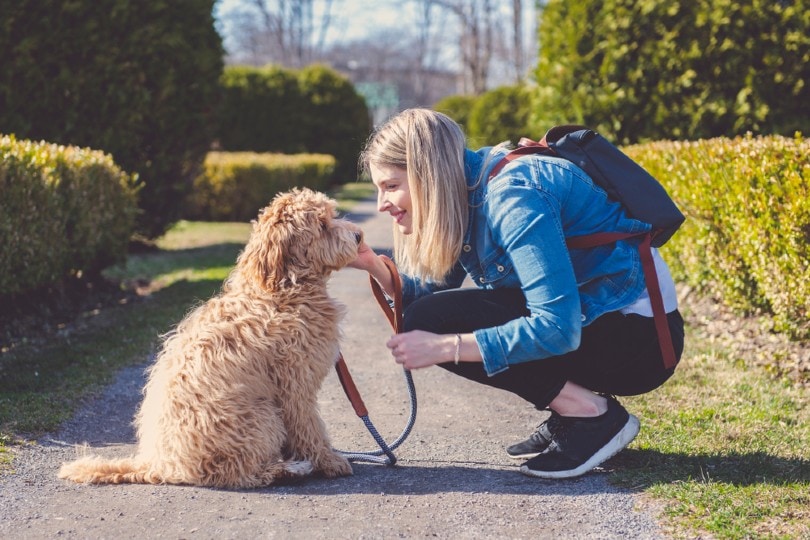
Conclusion
We know you love wrapping your arms around your dog. These are natural love languages for human beings. And although studies show that dogs really don’t like hugs all that much, we implore you to use your judgment.
Some dogs will literally request these behaviors from their humans, while others will tolerate it at best. If it seems like your dog is reluctant to receive this kind of affection, as much as you want to, it’s best to refrain entirely. There are many other ways you can interact with your dog to make them equally as happy.
In any case, hugging is as abnormal to dogs as butt sniffing is to humans—so, even though they might find the behavior strange, your dog will generally tolerate your shenanigans. Stay safe!
Featured Image Credit: Shift Drive, Shutterstock






